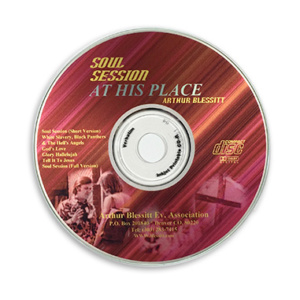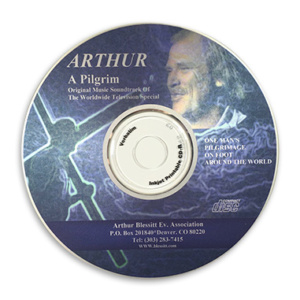Chapter 11
Jesus and the
World’s
Religions
There is one God and one Mediator between
God and men, the Man Christ Jesus, who
gave Himself a ransom for all.
—1 Timothy 2:5-6
One day I was talking with my wife, Denise, and some others about sharing Jesus with people of different religions. After several minutes, Denise said, “Arthur, no matter who you’re talking to and what religion they belong to, you have the same response for them: Jesus.”
I said, “That’s right! It’s all about Jesus.” And it’s true. In one sense, it doesn’t matter what religion a person identifies with. Every single one of us on the globe, regardless of religious involvement (or lack thereof), needs Jesus. That makes sharing with different people a lot simpler!
I know what I’m talking about here. During my cross walk around the world, I have shared Jesus with people who live in every nation of the world and who belong to all of the world’s major religions. I have also seen thousands of them receive Jesus as Savior and Lord and become followers of Jesus.
A Life Given, Blood Shed, a Covering Made
Comparative religions experts like to show how different religions resemble each other. But there is one important—indeed, crucial—way in which following Jesus is different from practicing any other religion.
In almost all religions, people are trying to make contact with God through some kind of self-effort. The followers of Jesus have a totally different concept. The Bible teaches us that God first loved us and that He reaches out to us. Salvation, then, lies not in our own efforts but instead was provided through Jesus’ death on the cross. We need only to repent and receive Jesus as our Savior and Lord.
Now, I say all this not to put down other religions. In fact, we should never put down or make fun of other religions. But I want to make very clear that the cross is an absolute necessity for anyone to be accepted by God.
Self-effort, however well intended, will never bring anyone into the kingdom of God; only receiving salvation as a gift because of the blood of Christ can do that.
The Bible is consistent all the way through in demonstrating that the shedding of blood is essential to forgiveness. The Old Testament law teaches that “the life of all flesh is its blood” (Leviticus 17:14). Referring to Jesus’ self-sacrifice, the writer to the Hebrews said, “Without shedding of blood is no remission [of sin]” (Hebrews 9:22).
The importance of death and blood goes right back to the first sin. After Adam and Eve had transgressed against God, but before He cast them out of the Garden of Eden, God used animal skin to make clothes for the first couple (Genesis 3:21). In other words, He killed one or more animals to make this covering possible for them.
Several laws and incidents from the Old Testament period reveal the importance of blood in deliverance from sin. Abraham led his son Isaac up a mountain and laid him upon an altar at the command of God, but God then provided a ram to take Isaac’s place. God told Moses that the Hebrews in Egypt were to put the blood of lambs upon their doorposts so that when the death angel came, he would see the blood and pass by. Once a year the high priest was to kill a spotless lamb and sprinkle its blood upon the altar in the holy of holies.
But all this was preparatory for the paramount case of blood shedding in history: the sacrifice of Jesus. Jesus was born without sin. The Holy Spirit put the seed of Jesus in His mother’s womb. And we know that the blood of the mother does not run through the child. The child receives nourishment from the mother but not the blood of the mother. So the blood of Jesus was the holy blood of God.
Jesus lived without sin. He showed His power over all the created universe as He healed the sick, raised the dead, controlled the weather, walked on water, multiplied bread and fish, and did many other miraculous things, including raising the dead. Then Jesus, fulfilling the prophecies of the Scriptures, suffered, carried the cross, and was crucified on the cross for our sins.
In many places, the Scriptures tell us about the effectiveness of Jesus’ blood in washing away our sin. Jesus Himself, when celebrating Passover with His disciples on the night before His death, declared, “This is My blood of the new covenant, which is shed for many for the remission of sins” (Matthew 26:28).
As we think about the religions of the world,
we must always remember that salvation is
not by the works of a person but by the
cleansing blood of Jesus.
We are also told, “Jesus Christ … loved us and washed us from our sins in His own blood” (Revelation 1:5).
That’s what soap does with dirt and stains. It loosens the dirt from the cloth so that the water washes it away. Jesus loosens the sin from us and washes it away in His blood.
As we think about the religions of the world, we must always remember that salvation is not by the works of a person but by the cleansing blood of Jesus. “Nor is there salvation in any other, for there is no other name under heaven given among men by which we must be saved” (Acts 4:12). And in the end, all people will recognize the supremacy of Jesus.
“God also has highly exalted Him and given Him
the name which is above every name, that at the
name of Jesus every knee should bow, of those in
heaven, and of those on earth, and of those under
the earth, and that every tongue should confess
that Jesus Christ is Lord, to the glory of God the
Father”. (Philippians 2:9-11)
Let us obey Christ the Lord and share the loving message and person of Jesus with the world. There is hope, love, mercy, and salvation for all who call upon the name of the Lord. Remember, Jesus gave His life; Jesus shed His blood; Jesus is the covering for our sins.
Jesus for All
The following are tips for sharing Jesus with people of other religions or none. Remember, the most important thing is always to stay with the subject of Jesus.
• Islam. Jesus said, “Blessed are the pure in heart, for
they shall see God” (Matthew 5:8).
Muslims believe in a personal god. As is true of all religions, one of the most powerful points in sharing with a Muslim is how we can have a pure heart. I will often ask a Muslim, “How do you have a pure heart?” He will then tell me how he obeys the rules of his religion, gives alms, and so on. Then I say, “I don’t know about you, but my efforts and goodness don’t take away any sins of mine, nor do they give me a pure heart. What I need is a new heart and a new life, and that’s what Jesus came to give. ‘If anyone is in Christ, he is a new creation.’ Jesus will give this new heart and new life and make a home for us in heaven.”
At other times, I’ll just start talking about Jesus. After all, Jesus is mentioned in the Qur’an and is honored within Islam, which considers Him to be a prophet but not the Son of God. I will say, “I don’t know much about Muhammad, so let’s talk about Jesus.” And we do.
On one occasion my wife, Denise, and I were climbing the mountains of Hindu Cush with the cross, going from Pakistan into Afghanistan. We got as high as 18,200 feet above sea level, high above two glaciers, and carried the cross from village to village. Meanwhile, our guide was a Muslim who at first refused to interpret for us the message of Jesus. In fact, he refused to even say the name of Jesus. But God was healing people, and we would communicate with the people using simple hand signals, such as pointing to someone’s heart and saying, “Jesus.”
Our guide watched what was going on and finally was willing to discuss the life and message of Jesus with us. Before we left that part of the world, he came to believe in and receive Jesus Christ as his Savior and Lord. He has since gone back to those villages, sharing the message of Jesus, and many have become followers of Jesus.
Here is an e-mail message that I recently received from him:
Thanks to my Lord and for your guidance. This
is you and your patronage and prayers. I can see
the big change in my life. I am feeling proud. My
Lord Jesus is coming to me in dreams. He is so
happy. I am so happy. Sometimes I see Him in the
day while walking on the road traveling, and
sometimes in the office. Yes, every movement and
every time when I used to do some good works.
Oh my Lord Jesus I love You. I praise. I praise You.
I thank You. You are my protector. You’re my only
provider. My praise and love is for You.
• Judaism. “Let all the house of Israel know assuredly
that God has made this Jesus, whom you crucified,
both Lord and Christ” (Acts 2:36).
Jews believe in a personal God, the God of the Hebrews Scriptures (Old Testament). And Jesus was a Jew. But Jews are like everybody else in the world in that they need Jesus as Savior and Lord. I find that most Jewish people are interested in hearing about Jesus and His message.
In 1980, political relations between Israel and Egypt improved as the two countries exchanged ambassadors and recognized each other. The border between the two nations was scheduled to be opened so that travelers could pass from one nation to the other. I was called by Jesus to carry the cross from Jerusalem to Cairo across the Sinai Desert and to be the first person allowed through on the historic day when the border opened.
The day before the border opening, I walked up to the Israeli side of the border and spoke to the captain standing there. I said, “I want to be first in line tomorrow. Where does the line form, so I can put my sleeping bag there?” He said, “Well, you’ll be first. You’ve walked from Jerusalem.” I asked, “But can I sleep here? I really want to be first.” He patted the gun on his hip and said, “I’m telling you, you’ll be first in the morning. Do you really want to sleep here?”
I answered, “That’s fine with me.”
“Wouldn’t you like a bed?”
“Well, sure. I’d be willing, but I want to be first.”
“I told you that you’ll be first.”
The captain went away to try and find someplace where I could spend the night. When he came back, the other officers were laughing and grinning and said to me, “Guess where you’re spending the night tonight?”
“Where?”
“Prime Minister Begin’s house.”
They weren’t kidding. Menachem Begin had a house in the Sinai, and I was invited to spend the night there. That night I stored my cross in the Israeli prime minister’s living room.
The next morning I was back, first in line, and the same captain was standing there. I had learned his name was David Yaniv. I said, “Captain David, Jesus loves you. You can know Him.”
He said, “Well, I’m Jewish.”
I said, “Jesus was too, and He loves you. He died and rose again for you.”
Maybe Yaniv had grown uncomfortable with the course of the conversation, because he changed the subject. He said, “They’ll kill you over there. Those Muslims will kill you over in Egypt.”
I replied, “They told me you were the bad guys.” “No, no. We’re the good guys; they’re the bad guys.” “One day you’re going to get saved and worship Jesus.”
Twenty-five years later, I appeared on a TBN television program, and guess who was on the set with me? David Yaniv. The Israeli captain who guarded that border is now a follower of Jesus and is the pastor of Roots Messianic Congregation in Lynnwood, Washington.
• Hinduism. “It is appointed for men to die once, but
after this the judgment” (Hebrews 9:27).
This is an incredibly diverse and complex religion, with many gods and many religious practices. And because Hindus worship many gods, it is often no trouble getting them to accept Jesus as yet another god. The challenge is getting them to understand and accept the exclusive claims of Jesus and see their need of a personal Savior.
When sharing Jesus with a Hindu, we need to make very sure that our terms are clear and that we are communicating accurately.
One time Denise and I arrived in the nation of Myanmar and shared Jesus with our Hindu taxi driver. I thought we had done a great job of sharing about salvation in Jesus. Then, at the end of the conversation, I asked the driver, “Will you pray to receive Jesus?” I was delighted to hear him say yes, and I started leading him in prayer. As I was finishing up the prayer, I used the phrase “and make my home in heaven.” At that point the taxi driver stopped repeating after me. He said, “I don’t want to come back in heaven; I want to come back as an American.”
I have to confess, that was one I didn’t have a quick comeback for! But I quickly realized that the driver was thinking in reincarnation terms. I told him, “You have never been to America. America is not heaven.” Then I tried to straighten out his thinking.
The resurrection of Jesus Christ makes all
the difference in the world, perhaps
especially with Hindus.
Another time, when talking to a Hindu in Bali, Indonesia, I handled it better. In sharing there with a man about Jesus, I went through the life of Jesus and the cross and the resurrection of Jesus. At that point the man interrupted and said, “Jesus was reincarnated. I can understand that.”
“Listen carefully,” I replied. “Jesus came back in the same body.”
The resurrection of Jesus Christ makes all the difference in the world, perhaps especially with Hindus. The risen Christ is not one of many gods but the unique God. This is what we have to help Hindus understand.
• Buddhism. “Men of Athens, I perceive that in all things
you are very religious; for as I was passing through and
considering the objects of your worship, I even found an
altar with this inscription: TO THE UNKNOWN GOD.
Therefore, the One whom you worship without knowing,
Him I proclaim to you” (Acts 17:22-23).
Buddhists believe that God is a concept, not a personal Being. They remind me of some people whom the apostle Paul encountered in Athens. These Athenians had erected an altar inscribed “TO THE UNKNOWN GOD,” and similarly Buddhists don’t know God or even recognize that He exists. Paul said to the Athenians, “The One whom you worship without knowing, Him I proclaim to you” (Acts 17:23). Following his lead, we need to proclaim to Buddhists the God whom they are missing out on. We come to know God through His Son, Jesus.
Buddhism is about overcoming suffering. We can show what Jesus did to suffer for us and take away our need to suffer for our sins now and in eternity. My wife, Denise, and I were carrying the cross in Sri Lanka—a predominately Buddhist nation—when one day a man came up to Denise and said, “What is his name?” He was pointing at me and at the cross. Denise replied, “His name is Arthur Blessitt, and he is carrying the cross around the world.”
The man said, “I’ve seen this,” again pointing at the cross and me. “I was dying one night, but a Man came to me. Oh, I can never forget Him! He said I should follow Him. Afterward, I was immediately well. “I began praying only to Him, but I did not know His name. Passing a store one day, I saw a picture of Him. He was hanging on a big cross like this. I said, ‘This is the gentleman!’ I bought the picture and follow only Him, but I don’t know his name.”
We explained to the man that I was not Jesus. This man did not even know the name of Jesus. So I told him that my name was Arthur Blessitt and that the man on the cross was Jesus.
?We told him about the Bible, which explains much more about Jesus. We helped the man to understand who Jesus is from the Bible and know how to receive Him as Savior and Lord. We prayed with this man, and he gloriously welcomed Jesus into his life. It was one of the most moving times of witness I have ever experienced.
Jesus had revealed Himself to this man; now we were privileged to tell him more and lead him into the Kingdom.
With Buddhists, like this man in Sri Lanka, it is important to show the need for a personal relationship with a personal God.
• Jehovah’s Witnesses and Mormons. “I testify to everyone
who hears the words of the prophecy of this
book: If anyone adds to these things, God will add to
him the plagues that are written in this book; and if
anyone takes away from the words of the book of this
prophecy, God shall take away his part from the Book
of Life, from the holy city, and from the things which
are written in this book” (Revelation 22:18-19).
These groups promote grave errors on the deity and person of Jesus, among other things. They have changed the Scriptures to reflect their false beliefs. We need to lead them to Jesus, the unique Son of God. It is necessary for us to lead, and not be led by, those who come to our door seeking to convert us to Mormonism or the Jehovah’s Witnesses. Sometimes, after giving a clear witness to them, we can then have a prayer with our visitors and say goodbye. We should never get caught up in arguing and debating about the Bible with them.
• New Age. “Beware of false prophets, who come to
you in sheep’s clothing, but inwardly they are ravenous
wolves” (Matthew 7:15).
New Agers are just grooving and wanting everybody to feel good about everything no matter what they are into. As they say in California, “different strokes for different folks.” With New Agers, we must point to the reality of sin and the personal need for Jesus.
• Christian. “I say to you, unless one is born again, he
cannot see the kingdom of God” (John 3:3).
Not every Christian knows Jesus as Savior and Lord. There is a difference between calling oneself a Christian and really knowing Jesus and being a follower of Jesus. Many think that, because they were baptized, were born into a Christian family, or have been involved with church in some fashion, there is nothing more they need to do. Wrong! Everyone needs to receive Christ personally and be born again into His kingdom in order to be a true follower of Jesus.
There is a difference between calling oneself
a Christian and really knowing Jesus
and being a follower of Jesus.
On a warm day in the early 1980s, during a long cross walk from Warsaw to Czestochowa, Poland, I stopped to rest. My interpreter, an English-speaking Polish school teacher, was sitting near me and we were eating as we sat in the grass. People were all about me, when suddenly through the crowd came a young woman who sat down in front of me.
The girl (whose name I soon discovered was Anna) was beautiful. Twenty-four years old, she had lovely clear eyes and short blonde hair. But she sat there with tears running down her face, and—oddly—her legs were covered in blood. She began talking rapidly. I asked my interpreter what she was saying.
He explained, “She heard that you know how to find Jesus.” I kept looking at the girl’s bleeding legs. I asked, “What’s wrong with her legs?” “Do you see that hill over there and the people climbing up it on their knees?” the interpreter asked. “She has been climbing that hill on her knees to show her love for Christ and has been trying to find Jesus. Someone just told her that the man with the cross knew how to talk with Jesus, so she has come to see if you can tell her how to find Him.”
I explained to her, “Jesus loved you before you ever started up that hill, and He loves you now that you have come down. All that blood was not necessary; He has already shed His blood for you. Now, I know He appreciates your desire to show your love, but you don’t have to do that to prove you love Him. He can live in your heart.”
I explained to her how Christ had died for her and had offered her the gift of salvation. She could pray and invite Jesus into her heart and He would become her Savior.
Through the interpreter, I led Anna in a short prayer. Before I finished, Anna burst into tears, leaped into my lap, and began to cry, hugging and laughing and smiling. Then she jumped up and started to run away. “Wait! Come back!” I called.
She turned and said, “I have found Jesus. I found Him. Now I know Him—that is all I need. Now I can go. I’ve found Him! I’ve found Him!” And she ran away.
Perhaps like Anna, you, my reader, were raised within some form of Christianity.
Let me tell you something: the most important thing in sharing Jesus with others is that you, yourself, know Him. Let me ask you at this point, do you have the assurance that, should you die, you would go to heaven? Should you not have this assurance, then you will never share Jesus in power and consistently. In that case, receive Jesus now and become a true follower of Jesus.
Remember, it’s all about Jesus. Whether people already have another religion or have none at all, we are to discuss Jesus and point people to Him and His love and salvation.
In Defense of Conversion
In this day of “tolerance” and pluralism, the very idea that we would try to persuade someone of another religion to follow Jesus is by many considered to be proof that we are narrow-minded, backward, and probably cruel. Sure, it’s okay to try to convert people in other lands to practicing democracy, to treating wives and children differently, to observing human rights, to buying our products, and even to changing sexual practices in order to prevent AIDS. But when it comes to a person’s relationship with God, it’s hands off.
Even some who follow Jesus (or at least claim to) think that it would be better if we left people of other religions alone. Maybe they are so aware of the prejudice against proselytizing that they are worried about looking bad.
Do we believe that people without Christ are destined for hell, or do we not? Should we not, then the critics are right—there is no necessity for sharing Jesus with others (and maybe not much point in following Him either). But should we believe the Bible when it says that people who have never trusted in Christ are headed for an eternity apart from God, then we must act!
Jesus spoke more about hell than did anyone else in the Bible. Eternity and heaven and hell are not creations of the church; they are central parts of the message of the Bible. We cannot pick and choose which parts of Scripture we are to believe and follow.
As followers of Jesus, we are to care, not only for people’s bodies and human rights, but also for their souls and their eternal destinies. A person who cares where another spends eternity truly loves that person! The reason Jesus came to earth was to seek and to save those who are lost.
Whether they are within the church or outside it, people who are critical of trying to convert others don’t really have a problem with those like me who go to people of other religions with the message of Jesus; they have a problem with Jesus Himself. He was the one who commanded His followers, “Go into all the world and preach the gospel to every creature” (Mark 16:15). “Every creature” includes the Hindu, the Buddhist, the Muslim, the Jew, the Christian, the tribal worshiper, and people of every other religion and spiritual practice on earth.
The church of Jesus Christ has been a converting church since the beginning. On the Day of Pentecost, God worked a miracle so that “Parthians and Medes and Elamites, those dwelling in Mesopotamia, Judea and Cappadocia, Pontus and Asia, Phrygia and Pamphylia, Egypt and the parts of Libya adjoining Cyrene, visitors from Rome, both Jews and proselytes, Cretans and Arabs” could hear the followers of Jesus speaking the wonderful works of God and praising God (Acts 2:9-11).
Three thousand people were converted, became followers of Jesus, and were baptized that day.
Early believers took the message about Jesus all over the Roman Empire to Jews in the synagogue and pagans in the marketplace. They were so powerful in the Holy Spirit that they shared Jesus in all the known world of the Roman Empire and beyond. As Paul testified, “I thank my God through Jesus Christ for you all, that your faith is spoken of throughout the whole world” (Romans 1:8; see also Colossians 1:4-5).
This explosion of witness and energy took place in the early decades and centuries of the church. Historians tell us that, within one hundred years of Jesus’ death, churches flourished in nearly all the Roman provinces and even as far away as India.
We are all beneficiaries of proselytism for Christ. Indeed, every one of us has roots in some place where people were once converted to the faith of Jesus. For example, my wife, Denise, is from England, a land where the people followed the Druid religion before becoming Christians. Many of the Muslim lands, where people are now persecuted for proselytizing for Christ, were once nations where the majority of people were followers of Jesus.
Truth, by its very nature, is exclusive. Certainly we must defend the right of others to choose their religion— freedom of conscience is a fundamental human right. And we should always show respect for, and never criticize, other religions, even when we see aspects of them that trouble us. We don’t want to be negative; we want to be positive. We aren’t even really trying to persuade anyone to accept a new religion—we are introducing them to a person: Jesus Christ. Let Him change the way they believe, act, and worship.
“There is one God and one Mediator between God and men, the Man Christ Jesus, who gave Himself a ransom for all” (1 Timothy 2:5-6). Only one Mediator for all, that’s what Jesus is. And that’s why we need to tell everyone about Him. God has planted a yearning for Him in every human heart; we are just helping them to satisfy that yearning properly.
The Bible teaches that God first loved us and reached out to us. We are not saved by our own works of righteousness but by the grace of God (Ephesians 2:8-9). Thus it is not our own effort that gains our acceptance but the effort of God in doing what it takes to save us through His Son. We need only to repent and receive Him as Savior and Lord. I make this point because it means we don’t have to debate people about their religious views; we only have to share Jesus with them. As we do that, the Holy Spirit will draw them to God.
My fellow follower of Jesus, it is time we not be intimidated by the opinions of critics but instead be filled with the love of God so that we may speak of Jesus and His wonderful life and message. We are bearers of good news!
How beautiful upon the mountains are the feet of him who brings good news, who proclaims peace, who brings glad tidings of good things, who proclaims salvation. (Isaiah 52:7)
___
Questions to Consider
• In your own words, what is unique about following
Jesus?
• Among your friends and acquaintances, which
of them are following another religion? How can
you share Jesus with them effectively?









